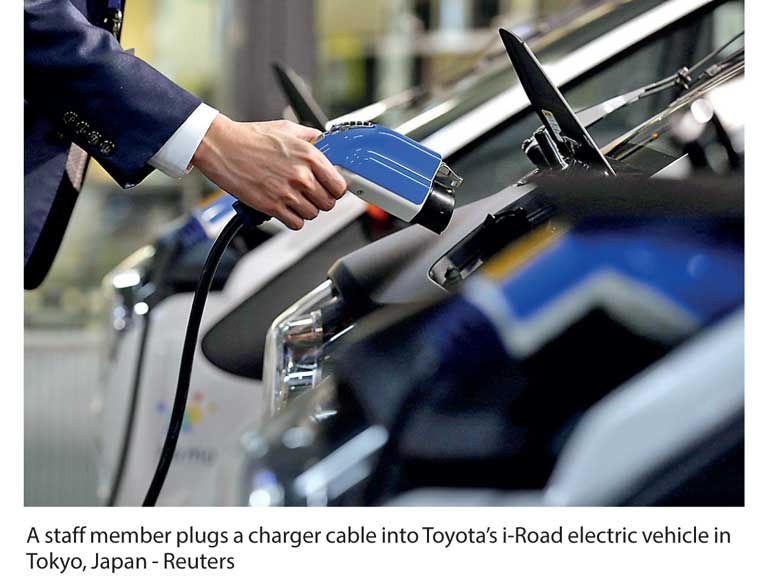Monday Feb 23, 2026
Monday Feb 23, 2026
Wednesday, 20 December 2017 00:00 - - {{hitsCtrl.values.hits}}

TOKYO (Reuters) - Toyota Motor Corp said it would market more than 10 all-electric vehicle (EV) models globally in the early 2020s, a target which could require the firm to look beyond a partnership with Panasonic Corp to co-develop and supply batteries.
Setting an annual sales target of around 1 million zero-emission battery EVs and fuel-cell vehicles (FCVs) by 2030, the automaker said in order to achieve this it would need to make an investment of over $13 billion to develop and make batteries.
Toyota, the world’s second-largest automaker by sales after Volkswagen AG, added it needed to accelerate the pace of battery development as tightening global vehicle emissions regulations would require a steep increase in manufacturing capacity for more powerful batteries.
“As a mass-market automaker we need to expand our offering of electric cars,” Executive Vice President Shigeki Terashi said at a briefing in Tokyo on Monday, adding that Toyota would introduce pure-battery models initially in China, followed by Japan, India, the United States and Europe.
Industry experts anticipate plug-in hybrid petrol-electric vehicles and all-battery EVs will account for as much as 26 percent of global car sales by 2030, versus just over 1 percent last year, data from the International Energy Agency shows.
Toyota has ramped up its EV development since last year when it announced it would add fully electric vehicles to its product line-up, surprising some industry players as it had long touted a green-car strategy focusing mainly on plug-in hybrid and FCVs.
Toyota expects EVs to account for around half of its global sales by 2030, when it aims to sell 4.5 million petrol-electric and plug-in hybrid vehicles annually.
Volkswagen is aiming for 2-3 million EV sales by 2025.
Last week, Toyota said it and partner Panasonic were considering developing next-generation EV batteries, including solid state batteries, while it has also tied up with Mazda Motor Corp and Suzuki Motor Corp on EVs.
At the moment, supply of EV batteries is dominated by a huddle of producers including LG Chem and Panasonic. Terashi said joining forces with Panasonic may not be enough to meet its battery needs by 2030, and that Toyota was open to striking additional partnerships. Producing batteries for so many EVs would pose a challenge “on a different dimension”, said Terashi, who heads Toyota’s EV business planning department.
“Even if we develop an advanced solid state battery, there’s no way we could mass produce it on our own.”
NEW DELHI: Japanese automobile major Toyota lost a legal battle in the Supreme Court for exclusive trademark rights over ‘Prius’, the name under which it had launched its first mass produced hybrid car in Japan in 1997 and in the UK, Australia and the US in 2000-2001.
The main reason for Toyota losing exclusive use of the ‘Prius’ trademark in India was the late launch in the country, in 2010. It found that an auto spare parts maker, Prius Auto Industries, had been using the name ‘Prius’ as well as ‘Toyota’, ‘Toyota Innova’ and ‘Toyota Device’ for automobile parts it manufactured and supplied to the car manufacturing giant.
After several rounds of litigation in court, which Toyota had moved to protect its trademarks, the auto parts maker was restrained from using the name ‘Toyota’, ‘Toyota Innova’ and ‘Toyota Devices’. However, the Delhi-based auto parts maker was permitted to use the ‘Prius’ trademark.
Toyota moved the SC seeking to restrain the auto parts manufacturer from using the name ‘Prius’ and said it had obtained trademark registration of ‘Prius’ in Japan in 1990 and eventually in other countries. However, since the hybrid car was launched in India in 2010, Toyota had not registered the ‘Prius’ trademark in India till then.
This delay in seeking cancellation of the ‘Prius’ trademark, registered by Prius Auto Industries in 2002 for all types of auto spare parts and accessories, played a vital role in Toyota losing the legal battle in the SC. (Times of India)